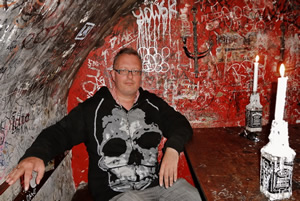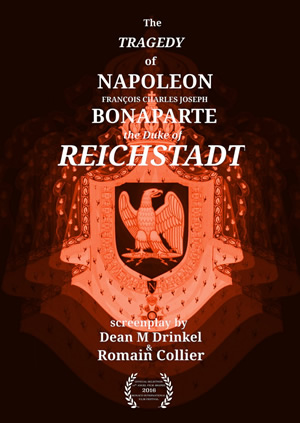 2016 Angel Film Awards - Monaco International Film Festival
2016 Angel Film Awards - Monaco International Film Festival 
THE ANGEL FILM AWARDS HONORING SCREENPLAY WRITERS
 
|
IN OFFICIAL SELECTION "THE TRAGEDY OF NAPOLEON FRANCOIS CHARLES JOSEPH BONAPARTE, THE DUKE OF REICHSTADT" WRITTEN BY DEAN M DRINKEL & ROMAIN COLLIER (UK/FRANCE)Bio: ROMAIN COLLIER is a published author and his recent story ‘SevenForEight’ appeared in the horror anthology THE THIRTEEN SIGNS (Nocturnicorn Books, 2016). DEAN M DRINKEL is an award winning script writer, director, author and poet. THE TRAGEDY OF NAPOLEON FRANCOIS CHARLES JOSEPH BONAPARTE, THE DUKE OF REICHSTADT is the first collaboration between two writers but several other projects are planned for the remainder of 2016 and beyond. Dean and Romain met in the Station Tavern, Cannes in May 2015 during the eponymous Film Festival and bonded over their mutual love of French history, literature, language and Karaoke! This first conversation was to have a huge impact on both their lives. During that same year they met several times again in Cannes and then in November in Paris where they visited the grave of Napoleon II and agreed that they would write a script together. Quickly they became the best of friends and in February 2016 Dean relocated from England to Cannes to work with Romain on the script – which was completed in October and which already has garnered a lot of interest within both France and Austria (where the story is set). Despite taking almost eight months, nine full drafts and eleven revision drafts to tell the story of little Napoleon, their friendship is stronger than ever. ‘THE TRAGEDY OF NAPOLEON FRANCOIS CHARLES JOSEPH BONAPARTE, THE DUKE OF REICHSTADT’ Screenplay Written by Dean M Drinkel & Romain Collier (UK/FRANCE) LOGLINE: (Genre: Historical Drama) They stripped him of his name. They stripped him of his title. They stripped him of his sanity. But they could not strip him of his soul. STORY OUTLINE: It is 1830, Napoleon Francois Charles Joseph Bonaparte – Napoleon’s son and heir, now commonly known as FRANZ – the Duke of Reichstadt - is living in Schönbrunn Palace, Vienna, as a guest of his grandfather, Emperor FRANCIS THE SECOND of Austria. Franz is nineteen, tall, energetic, of ruddy complexion but perhaps without purpose as he has been excluded from public life and exiled from the country of his birth since he (aged only four) and his mother (MARIE-LOUISE once Empress of France but now Princess of Parma)fled in 1814 following Napoleon’s abdication. Unbeknownst to him at first, young Franz’s life begins to be transformed however, when a French poet (AUGUSTE BARTHELEMY), fuelled by his own ambition, visits Vienna demanding to meet with Franz. Barthelemy approaches the Duke’s tutor, DIETRICHSTEIN, but is rebuffed several times. Unabated, Barthelemy discovers that Franz will be at the theatre the following night he attempts to speak to the Duke personally but is thwarted, dragged outside and beaten up by several Imperial Guards. Barthelemy returns to France and begins work on his poem about Franz called THE SON OF A MAN. Several months later, the poem is published to great acclaim in France and a copy finds its way to Vienna where it lands in the hands of the Chancellor of Austria, METTERNICH. Whilst it is true that Metternich orchestrated the marriage between Napoleon and the Austrian Archduchess Marie-Louise so many years before, it was done solely for diplomatic reasons, to ensure the safety of Austria. Metternich always hated the Bonapartes with a passion and sees young Franz as a continual thorn in his side, one he can’t seem to remove. Metternich is incensed that Barthelemy was allowed to get as close as he did to Franz and is concerned that the Duke could be kidnapped and returned to France and installed on the royal throne against his wishes. Metternich’s long term pursuit of bringing down the heir of Napoleon intensifies and he initiates a plot against the poet who has annoyed him so. With Metternich firmly pulling the strings from Austria, in Paris, Barthelemy is arrested and brought before a Tribunal. Despite a rousing argument and speech in his defence, and to the anger of the people, he is declared guilty and thrown into jail. But even though the poet has been silenced, people in France, who perhaps were previously unaware of the little Napoleon’s existence, start to ask questions and because they think the current king, Charles X, ineffective, they cause unrest throughout the country and Franz’s rescue from Austria is called for. Despite Metternich banning Barthelemy’s poem within the Austrian Empire, Franz is given a copy by a friend of the Archduchess SOPHIE and slowly, painfully, his eyes start to open. Whilst hurt by Barthelemy’s opinion of him, it awakens something deep within - he realises there is more to him than he is currently being allowed to be. He needs a friend. He needs someone to guide him. At a reception, Franz meets MAJOR ANTON PROKESCH who recognises something of his father in him and becomes the mentor the Duke so dearly desires. Under Prokesch’s tutelage, Franz blossoms. He studies. He learns. He leads. The change in Franz is noticed within the walls of Schönbrunn – particularly by the Chancellor who realises his plan must be expedited or he could lose everything. How does he do this? By giving Franz hope. Various thrones are offered to the Duke but Franz refuses them because he believes, due to the instability in France (first by Charles’s abdication, the question of succession and then the hatred within the country for the new king, Louis-Philippe) that, as is his birth-right, he will soon sit on his father’s throne. Sadly, however, as Franz’s mind strengthens, his body weakens and he falls seriously ill. He rallies briefly and is allowed to believe that finally, his ambition will be fulfilled and he will become King of France but Prokesch discovers Metternich’s plot - Franz’s world crumbles in around him. And that is the worst tragedy of all isn’t it? To give someone hope and then, at the last moment, snatch it away from them... |